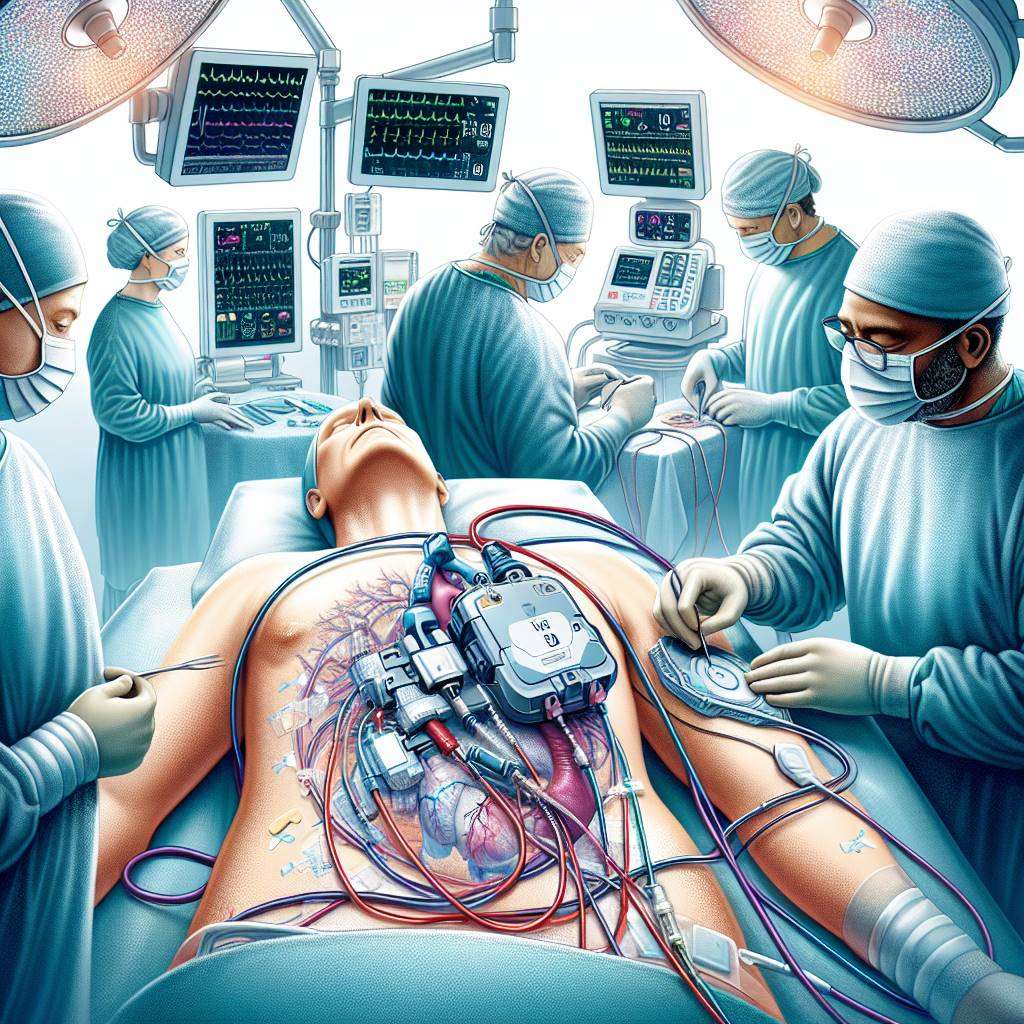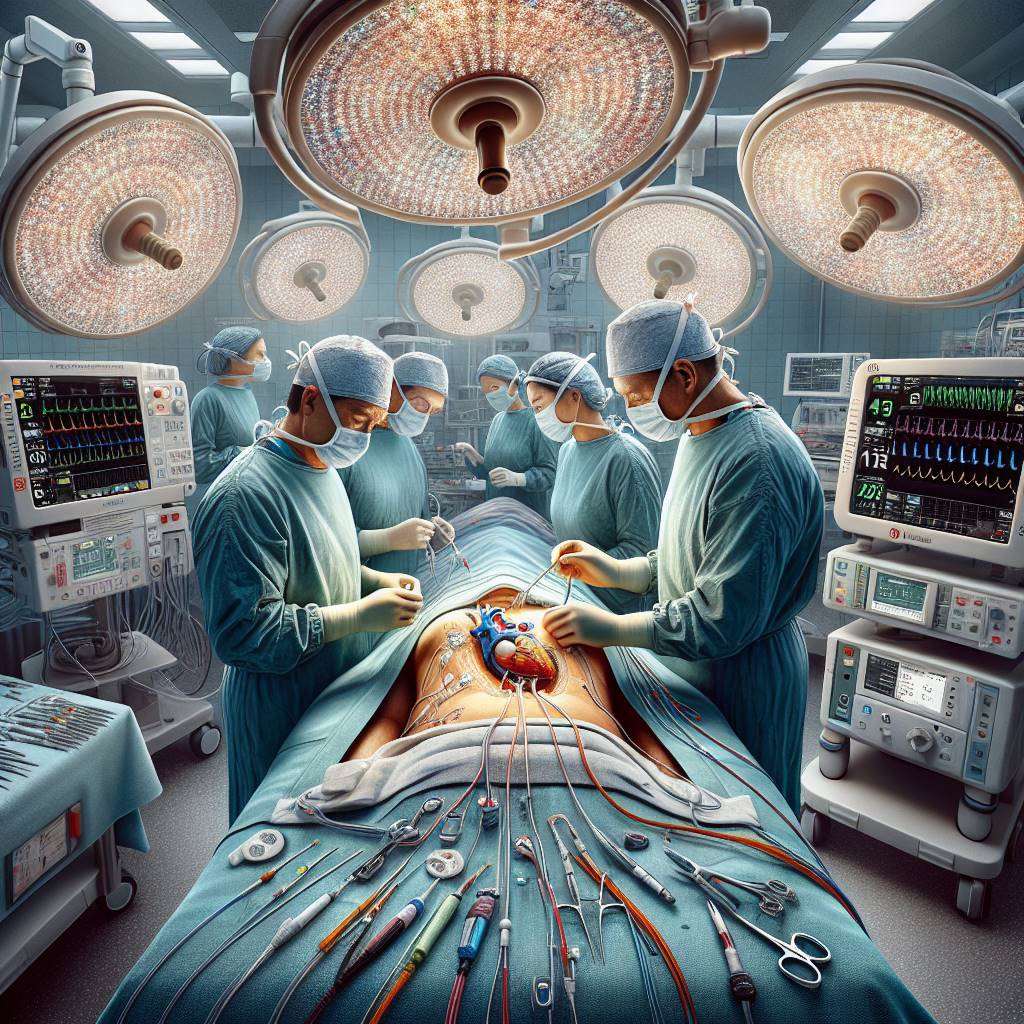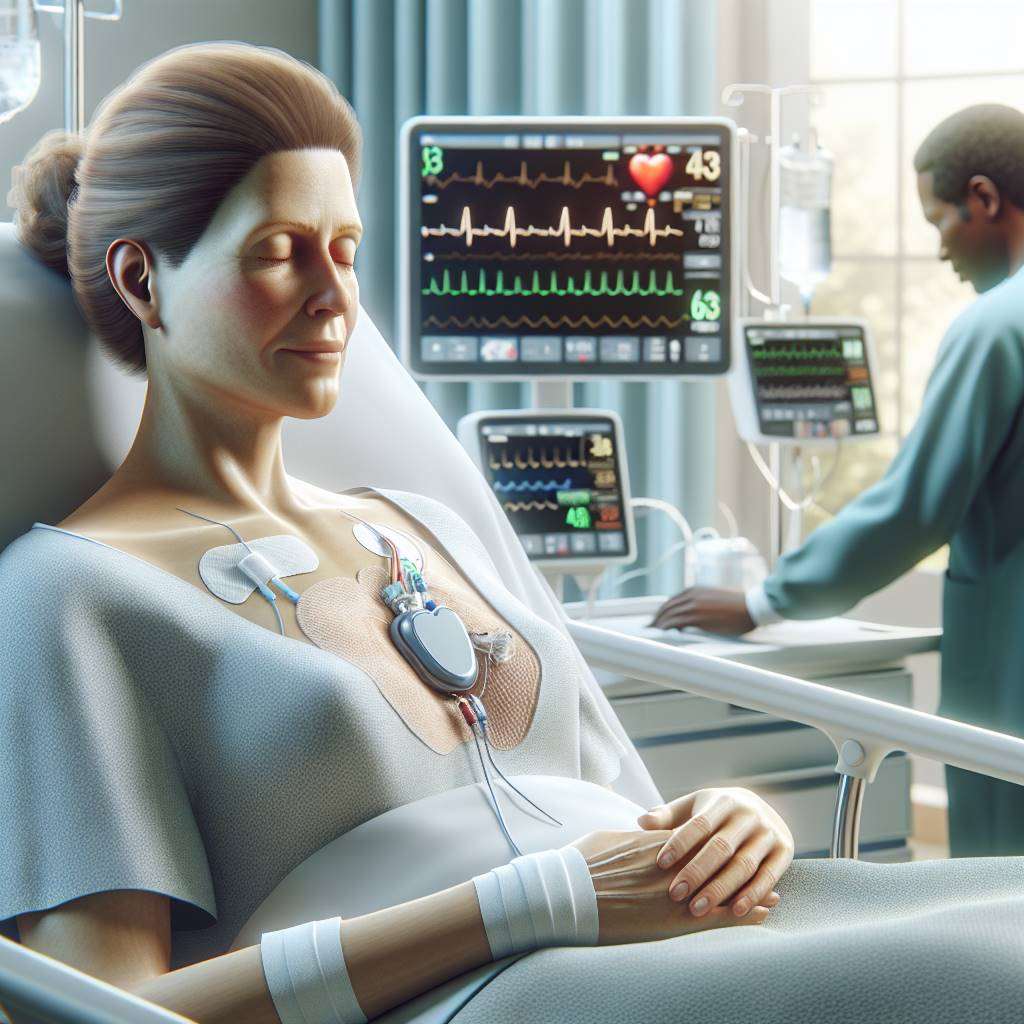An AICD, or Automatic Implantable Cardioverter Defibrillator, is a life-saving device designed to monitor and regulate abnormal heart rhythms. It is particularly crucial for patients at risk of sudden cardiac arrest due to conditions like ventricular fibrillation. By delivering electrical shocks when needed, an AICD helps restore a normal heart rhythm and prevents life-threatening complications.
Medical disclaimer: This content is for general awareness and does not replace a doctor’s consultation. For diagnosis or treatment decisions, consult a qualified specialist.
Understanding how an AICD works is essential for patients and caregivers managing serious heart conditions. This device is often recommended for individuals with a history of arrhythmias or weakened heart muscles. With advancements in medical technology, AICDs have become more reliable and effective, offering peace of mind and improved quality of life for patients at risk of cardiac emergencies.
Understanding AICD: What It Is and Why It's Used
An AICD is a small, battery-powered device implanted under the skin, typically in the chest area. Its primary function is to monitor the heart's electrical activity and detect irregular heart rhythms, known as arrhythmias. When the device identifies a dangerous rhythm, such as ventricular tachycardia or fibrillation, it delivers a controlled electrical shock to restore a normal heartbeat.
This device is particularly beneficial for patients with a high risk of sudden cardiac arrest, a condition where the heart suddenly stops beating effectively. The AICD continuously tracks the heart's activity, ensuring immediate intervention when needed. It is a critical tool in modern cardiology, helping prevent fatal outcomes in patients with severe heart conditions.

How Does an AICD Help Manage Heart Conditions?
The AICD plays a vital role in managing heart conditions by acting as a constant guardian for the heart. It is designed to detect and correct life-threatening arrhythmias, such as ventricular fibrillation, which can lead to sudden cardiac arrest. The device uses advanced sensors to monitor the heart's rhythm and identify abnormalities.
When an abnormal rhythm is detected, the AICD responds in one of two ways. It may deliver a low-energy pulse to correct minor irregularities or administer a high-energy shock to reset the heart's rhythm during severe arrhythmias. This dual functionality ensures that the heart remains in a stable rhythm, reducing the risk of complications and improving patient outcomes.
Who Needs an AICD? Key Indications and Benefits
An AICD is recommended for individuals at high risk of sudden cardiac arrest or those with a history of severe heart conditions. Key indications for AICD implantation include heart failure, previous episodes of ventricular arrhythmias, or a family history of sudden cardiac death. Patients with weakened heart muscles or structural heart diseases may also benefit from this device.
The benefits of an AICD are significant. It provides continuous monitoring of the heart, immediate intervention during emergencies, and peace of mind for patients and their families. By preventing fatal arrhythmias, the device improves survival rates and enhances the quality of life for individuals with serious cardiac conditions.
- Prevents sudden cardiac arrest
- Monitors heart rhythm 24/7
- Improves survival rates in high-risk patients
AICD vs Pacemaker: What’s the Difference?
While both AICDs and pacemakers are implantable devices used to manage heart conditions, they serve different purposes. A pacemaker primarily regulates slow heart rhythms, known as bradycardia, by sending electrical signals to stimulate the heart. In contrast, an AICD is designed to detect and treat fast or irregular rhythms, such as ventricular tachycardia.
The table below highlights the key differences between these devices:
| Feature |
Pacemaker |
AICD |
| Primary Function |
Regulates slow heart rhythms |
Detects and treats fast/irregular rhythms |
| Shock Delivery |
No |
Yes |
| Target Conditions |
Bradycardia |
Ventricular arrhythmias |
How an AICD Detects and Treats Abnormal Heart Rhythms
The AICD uses advanced technology to monitor the heart's electrical activity in real-time. It is equipped with sensors that detect abnormal rhythms, such as ventricular fibrillation or tachycardia. When an irregularity is identified, the device evaluates its severity and determines the appropriate response.
For minor irregularities, the AICD delivers a low-energy pulse to restore a normal rhythm. In cases of severe arrhythmias, it administers a high-energy shock to reset the heart. This immediate intervention is crucial in preventing sudden cardiac arrest and ensuring the patient's safety. The device also stores data on heart activity, which helps doctors adjust treatment plans as needed.
What Is an AICD and How Does It Work? A Beginner's Guide
What Is an AICD and How Does It Work? A Beginner's Guide
An Automatic Implantable Cardioverter Defibrillator (AICD) is a small device implanted in the chest to monitor and regulate abnormal heart rhythms. It is primarily used to prevent sudden cardiac arrest in patients with life-threatening arrhythmias. This guide explains how an AICD works, its benefits, and what to expect during and after the procedure.
What to Expect During an AICD Implantation Procedure
The AICD implantation procedure is a minimally invasive surgery performed under local anesthesia or light sedation. The device is placed under the skin, usually near the collarbone, and connected to the heart with thin wires called leads.
During the procedure, your doctor will make a small incision to insert the device and position the leads in the heart. The AICD is then tested to ensure it functions correctly. The entire process typically takes 1–2 hours, and most patients can return home the same day or the next.
After the surgery, you may experience mild discomfort or swelling at the incision site. It is essential to follow your doctor’s instructions for recovery and avoid strenuous activities for a few weeks.

Living with an AICD: Tips for Everyday Life
Living with an AICD requires some adjustments, but most patients can lead a normal life. It is important to avoid activities that may interfere with the device, such as using strong magnets or high-voltage equipment.
Here are some tips for managing daily life with an AICD:
- Carry an AICD identification card at all times.
- Inform healthcare providers about your device before any medical procedures.
- Avoid prolonged exposure to electromagnetic fields, such as those from MRI machines.
- Follow up regularly with your cardiologist to monitor the device’s performance.
With proper care and precautions, an AICD can significantly improve your quality of life while protecting you from potentially fatal heart conditions.
Risks and Complications of AICD Implantation Explained
While an AICD implantation is generally safe, there are some risks and potential complications associated with the procedure. These include:
- Infection at the implantation site.
- Bleeding or swelling around the device.
- Lead displacement, which may require repositioning.
- Rarely, damage to the heart or blood vessels.
It is crucial to monitor for signs of complications, such as fever, redness, or unusual pain at the incision site. If you experience any of these symptoms, contact your doctor immediately.
Despite these risks, the benefits of an AICD in preventing sudden cardiac arrest far outweigh the potential complications for most patients.
Can an AICD Prevent Sudden Cardiac Arrest?
An AICD is specifically designed to prevent sudden cardiac arrest (SCA), a life-threatening condition caused by irregular heart rhythms like ventricular fibrillation. The device continuously monitors your heart’s electrical activity and delivers a shock if it detects a dangerous arrhythmia.
Unlike medications, which may take time to act, an AICD responds immediately to abnormal rhythms, restoring the heart’s normal function within seconds. This rapid response can be life-saving, especially in high-risk patients with a history of heart disease or previous cardiac arrests.
While an AICD cannot cure the underlying heart condition, it provides a critical safety net, significantly reducing the risk of death from SCA.
How to Prepare for Your AICD Surgery
Preparing for an AICD implantation involves several steps to ensure a smooth procedure and recovery. Your doctor will provide specific instructions based on your medical history.
Here are some general guidelines:
- Inform your doctor about all medications you are taking, including blood thinners.
- Avoid eating or drinking for at least 6–8 hours before the surgery.
- Arrange for someone to drive you home after the procedure.
- Follow any additional pre-surgery instructions provided by your healthcare team.
By following these steps, you can minimize risks and ensure a successful implantation. Don’t hesitate to ask your doctor any questions or address concerns before the surgery.
Post-Implantation Care: Recovery After Getting an AICD
After receiving an AICD (Automated Implantable Cardioverter Defibrillator), proper care is crucial for recovery. Patients should avoid strenuous activities for the first few weeks to allow the incision site to heal. Follow-up visits with your cardiologist are essential to monitor the device's functionality.
It’s important to watch for signs of infection, such as redness, swelling, or fever, around the implantation site. Your doctor may recommend avoiding heavy lifting or overhead arm movements during the initial recovery period. Additionally, ensure you understand how the AICD works and what to do in case of device activation.

Common Myths About AICDs Debunked
There are several misconceptions about AICDs that can cause unnecessary worry. One common myth is that the device delivers shocks frequently. In reality, the AICD only activates when it detects a life-threatening arrhythmia, ensuring patient safety.
Another myth is that people with an AICD cannot lead a normal life. While certain precautions are necessary, most patients can resume daily activities, including work and mild exercise, after recovery. It’s also untrue that AICDs interfere with all electronic devices; modern devices are designed to minimize such risks.
Understanding the facts about AICDs can help reduce anxiety and encourage patients to focus on their heart health.
Cost of AICD in India: What You Should Know
The cost of an AICD in India varies depending on the type of device and the hospital. On average, the price ranges between ₹5,00,000 and ₹10,00,000. This includes the cost of the device, implantation procedure, and hospital stay.
Some factors that influence the cost include the brand of the AICD, the complexity of the surgery, and the hospital's location. Patients are advised to check if their health insurance covers the procedure, as many policies in India now include coverage for cardiac devices.
Here’s a quick comparison of costs:
| Type of AICD |
Approximate Cost (₹) |
| Single-Chamber AICD |
5,00,000–7,00,000 |
| Dual-Chamber AICD |
7,00,000–10,00,000 |
How Long Does an AICD Last Before Replacement?
The lifespan of an AICD typically ranges from 5 to 10 years, depending on the device model and how often it activates. The battery life is a key factor, as the device uses energy to monitor heart rhythms and deliver shocks when necessary.
Regular follow-ups with your cardiologist are essential to check the device's status. When the battery is nearing depletion, your doctor will schedule a replacement procedure. This is usually a simpler process than the initial implantation.
Advancements in technology have improved the durability of AICDs, ensuring better performance and longer life spans. Patients should always consult their healthcare provider for personalized advice on device maintenance and replacement.
Signs You May Need an AICD for Heart Health
An AICD is recommended for individuals at high risk of sudden cardiac arrest due to abnormal heart rhythms. Common signs include frequent episodes of fainting, a history of ventricular tachycardia, or a previous cardiac arrest.
Patients with conditions like heart failure or cardiomyopathy may also benefit from an AICD. If you experience symptoms such as palpitations, dizziness, or unexplained fatigue, consult a cardiologist immediately. Early diagnosis can prevent life-threatening complications.
Here are some key indicators:
- History of ventricular fibrillation
- Severe left ventricular dysfunction
- Family history of sudden cardiac death
Understanding these signs can help you take proactive steps toward better heart health.
Best Aicd Implantation Doctors in India
Dr. Balbir Singh, a renowned cardiologist at Medanta - The Medicity, Gurugram, holds a DM in Cardiology and has over 30 years of experience. Another expert is Dr. Praveen Chandra from Fortis Escorts Heart Institute, Delhi, with a DM in Cardiology and extensive international exposure. Both doctors are recognized for their expertise in AICD implantation and advanced cardiac care.
Learn more on best aicd implantation doctors in india
Best Aicd Implantation Hospitals in India
Fortis Escorts Heart Institute, Delhi, and Medanta - The Medicity, Gurugram, are leading hospitals for AICD implantation. Both are NABH and JCI accredited, offering advanced cardiac care, including robotic procedures and multidisciplinary teams. These hospitals are known for their international patient services and high success rates in complex cardiac cases.
Find more best aicd implantation hospitals in india
Aicd Implantation Cost in India
The cost of AICD implantation in India typically ranges from INR 5,00,000 to INR 10,00,000 (approximately USD 6,000 to USD 12,000). Factors influencing costs include the doctor’s expertise, hospital facilities, and device type. Patients usually require a 2-5 day hospital stay. India offers a significant cost advantage compared to Western countries, with options for insurance coverage and financing plans.
Learn aicd implantation cost in india
Aicd Implantation Treatment in India
AICD implantation in India involves placing the device under the skin near the chest, with leads connected to the heart. Advanced techniques like minimally invasive surgery and robotic assistance are used in top hospitals. Recovery typically takes 1-2 weeks. Indian hospitals follow global medical protocols and adopt innovations to ensure patient safety and successful outcomes.
Learn on Aicd Implantation Treatment in India
FAQs
What is an AICD?
An AICD (Automatic Implantable Cardioverter Defibrillator) is a small device implanted in the chest to monitor and regulate abnormal heart rhythms, particularly life-threatening arrhythmias.
Who needs an AICD?
Patients with a history of ventricular arrhythmias, heart failure, or those at high risk of sudden cardiac arrest may require an AICD.
How does an AICD work?
An AICD continuously monitors the heart's rhythm. If it detects an abnormal rhythm, it delivers electrical shocks or pacing to restore a normal heartbeat.
Is AICD implantation a major surgery?
No, AICD implantation is a minimally invasive procedure performed under local anesthesia or mild sedation, typically lasting 1-2 hours.
What are the risks associated with AICD implantation?
Risks include infection, bleeding, or lead displacement. However, these complications are rare when performed by experienced specialists.
How long does an AICD last?
The battery life of an AICD is typically 5-10 years, depending on usage. Regular follow-ups are necessary to monitor its performance.
Can I live a normal life with an AICD?
Yes, most patients with an AICD can resume normal activities, but they should avoid strong electromagnetic fields and follow their doctor’s advice.
What is the recovery time after AICD implantation?
Recovery usually takes 1-2 weeks. Patients are advised to avoid strenuous activities and heavy lifting during this period.
Is AICD implantation covered by insurance in India?
Yes, most health insurance policies in India cover AICD implantation. Patients should check with their insurer for specific details.
Can an AICD prevent a heart attack?
No, an AICD does not prevent a heart attack. It is designed to treat abnormal heart rhythms that can lead to sudden cardiac arrest.
Understanding AICDs: Guidelines and Choices for Athletes
For athletes with Automatic Implantable Cardioverter-Defibrillators (AICDs), navigating exercise can be challenging. It's crucial to understand the specific guidelines that govern physical activity for these individuals. In our detailed blog, we explore the exercise restrictions and recommendations for athletes with AICDs, ensuring they can safely engage in their sports while prioritizing their health.
Choosing the right type of AICD is equally important. Athletes may wonder whether a single-chamber or dual-chamber AICD is more suitable for their needs. Our informative article on this topic, provides a comprehensive comparison of single-chamber and dual-chamber AICDs, helping individuals make informed decisions based on their lifestyle and medical requirements.
By understanding both exercise guidelines and the differences between AICD types, athletes can better manage their conditions and continue to pursue their passions safely.